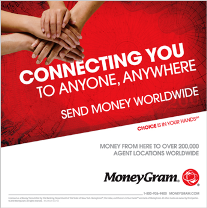 The default assumption for some is to ‘wire’ the funds (bank to bank transfer in a traditional bank ‘wire’). Others are now using ATM approaches — but doesn’t this always require the slight problem of having to physically ship (or carry) an ATM card to your overseas friend? And then there’s PayPal — but are the requirements for PayPal too much for some overseas friends living in remote lands? The choice I’m most interested in learning more about at this time is the Moneygram.com approach.
The default assumption for some is to ‘wire’ the funds (bank to bank transfer in a traditional bank ‘wire’). Others are now using ATM approaches — but doesn’t this always require the slight problem of having to physically ship (or carry) an ATM card to your overseas friend? And then there’s PayPal — but are the requirements for PayPal too much for some overseas friends living in remote lands? The choice I’m most interested in learning more about at this time is the Moneygram.com approach.
On the surface, it looks a lot handier than a ‘wire,’ and lots less troublesome than an ATM transfer (if you haven’t handed off an ATM credit or debit card to your overseas friend). Using your credit card from your laptop, your overseas friend can simply pick up the cash from a local moneygram.com vendor (assuming one is nearby, I guess) in MINUTES (literally), without having to log on to an online service and without having to show a credit card of any kind. If you want the money to come from your bank account, the delay is still only 3 days. Does anyone else have experience with Moneygram.com? …or a better approach?












We use Moneygram regularly and successfully to transfer cash to partners where regular banking options are not convenient. BUT, Moneygram doesn’t meet the auditing requirements of the UK charity regulator because you have no guarantee in the system that the cash has gone to the person and for the purpose. So some form of additional monitoring is required. Where there is a bank account available we find a regular bank transfer to be cheaper although a day or two slower.
We have used Moneygram and it is a superb and cost effective service. However, after ten transfers to different ‘missionary’ nations they very courteously declined to handle any more citing US regulations about money laundering. Disappointing, appeals very attentively also declined.
Using Money Gramm, Western Union, etc.. is easy although expensive, but if you live in a smaller remote area, there is the problem of people who watch foreigners and if you are seen going in and out of a money gramm Office. Since the only reason, is to send or receive money, you can become a target for thieves. of course this is the same with ATM’s or Banks, but you can draw smaller amounts and you can use ATM’s in different locations, if available. I use Western Union for more remote places in east Africa, because even in small towns, it is available, where the others are not.
I used http://www.xoom.com while in Brazil.. The service had the lowest fees when I checked into it.
I use MoneyGram all the time and have been very happy with the service and security.
For many years I would send cash glued between two postcards but then someone at the local post office in Africa found out about that.
Western Union is more expensive in the costs they charge.
Bank transfers are out of the question – sky-high costs.
Often I am not able to send very much to my missions-friends in Africa so finding a service that was reliable and cheap was my goal. I’ve sent quarterly amounts to Rwanda for over 5 years and never had a problem.
MoneyGram used to only draw from U.S.A. banking systems but I believe they now also draw from others.
Another option is PayPal but they, too, do not offer accounts to many 3rd world countries…. meaning that I could send it but they couldn’t receive it. (Obviously I never sent it then!).
For my money and to send smaller amounts safely to 2nd/3rd world countries, I use MoneyGram and have recommended it to others.
Of course, you could always try the double postcard method!
We’ve used http://www.moneycorp.com a little after Wells Fargo started charging a percentage fee for every international use of an ATM card. (Yikes that added up quickly. Moneycorp was OK, but HSBC have proved the best for us. Have an HSBC bank account in your name in both countries and you can transfer between them instantly from $7 per trx plus any monthly maintenance fees, and about 0.05% over the xe.com exchange rate. Overall it has worked best for us. That doesn’t help for sending to other people though.
My experience was not so positive. I sent money to a friend in Africa using Moneygram. They told him they needed a security question/answer (ala Western Union). By the time I was able to get back to him with the correct information that there is no security question, someone else had received the money and Moneygram was not very helpful. I lost the money.
Unfortunately this service is not even available in the country where we need to send funds.
Especially for NGOs this is a good service:
http://www.intlfcstone.com/foreignexchange/igcglobalpayments/Pages/default.aspx
It is not aservice available to everybody but to a specific business customer target group.
They give you a guaranteed rates of exchange before you execute the transfer and the beneficiary receives the funds in local currency.
It may not be the answer for every international transaction, but it surely is helpful for many locations. Also cuts out all international transaction fees. And has a proper audit trail from bank account to bank account.
I just googled Moneygram and they have poor reviews here: http://www.consumeraffairs.com/finance/moneygram.html
You mentioned the ATM route….what was done in my former organization was a simple deposit to the recipients home country bank account, from which they would withdraw using their own ATM. There were only a very few for whom this was not an option, depending on where they were serving.
Another exception that required wiring money was when a very large sum of money was needed to be accessed at once (exceeding their ability to withdraw via ATM).
Our bank gives us a break on the normally $45 bank wire ($25), so I use them for wires of larger amounts. I have never had a problem with MoneyGram. However, it is cheaper to use it to send to some countries (such as India) and more expensive for others (Nepal). I have used their services many, many times over the years and have never been shut down or had a problem. DON’T require a security question and don’t include a message. Also, it is cheaper to go to, for instance, Wal-Mart to send it then do it online. Some of the people we work with have ATMs, but it is hard for several reasons: limited amounts on daily withdrawals, problems with the machines, and (the worst) complicated bookkeeping on our part, since we have to parse out the fees with the amount withdrawn.
For transferring international funds to less remote locations, a friend just suggested Bitcoin:
Rumor has it that PayPal is considering accepting Bitcoin:
We have a page on the OSCAR website about this, but with a definite UK focus. I’d be interested in any updates we need to make. See http://www.oscar.org.uk/supporter/finance/sendingmoney.htm
While moneygram is definitely the easiest, I find most moneygram locations in 3rd world countries are not very secure locations. Whereas, 3rd world banking establishments are almost overly secure. I prefer the security over the ease, having been there (Haiti) myself.
I have never used MoneyGram for a few reasons: If I need an urgent transfer, I most often use WesternUnion, as they have many more locations all over the words and usually they are more both accessible for me and and for the receiving party. In I plan my transfer in advance, there are much more cost effective options, than MoneyGram, such as CurrencyFair, Xoom or Paysera. Using these options money can be sent to a bank account of the recipient. This usually takes the same – around 3 business days.